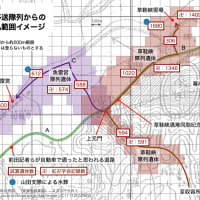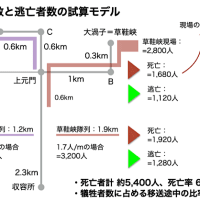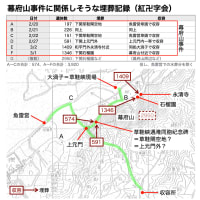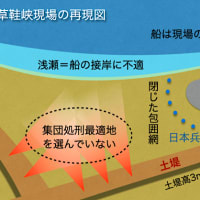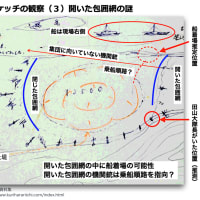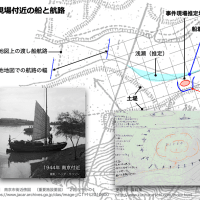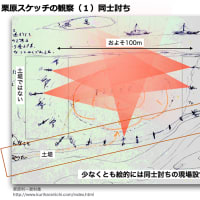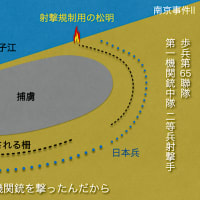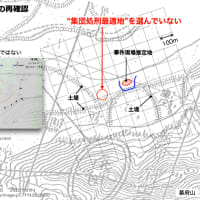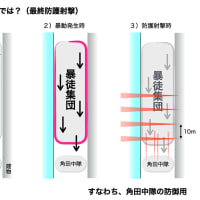2022.11.25 Updated
南京戦で第65連隊が多数の捕虜を殺害した事件(=幕府山事件)。これの犠牲者数その他の数字の計算方法。日英併記版。
The killing of many POWs by the 65th Regiment during the Battle of Nanking. How to calculate the number of dead and other figures. Japanese-English version.
全体の地図 Map of the whole area.
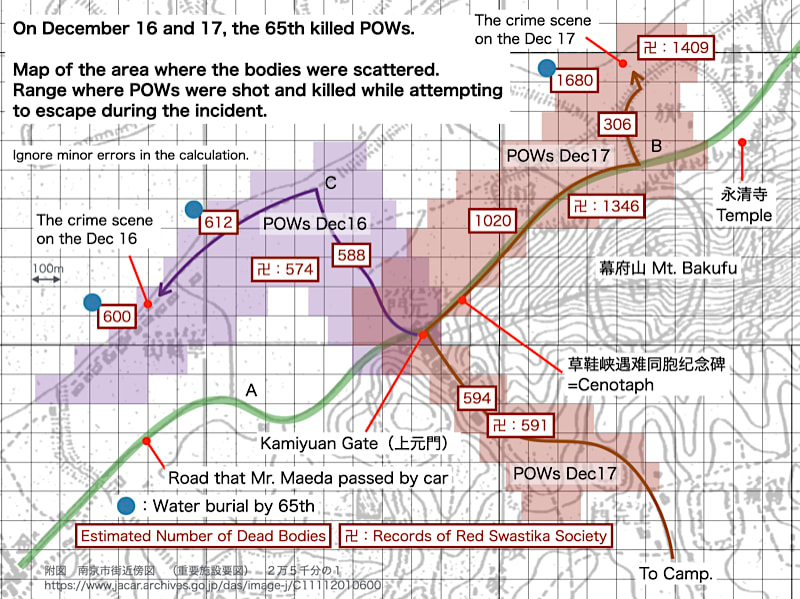
計算方法 Calculation Method.
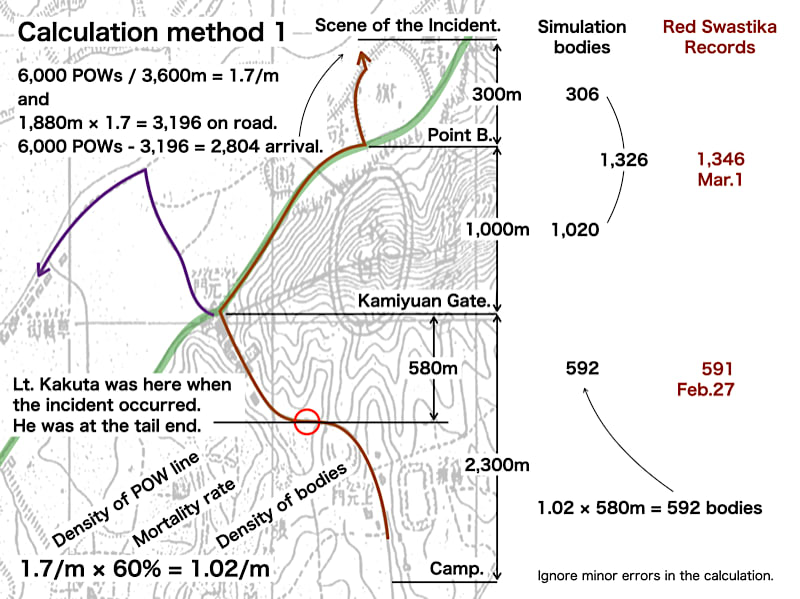
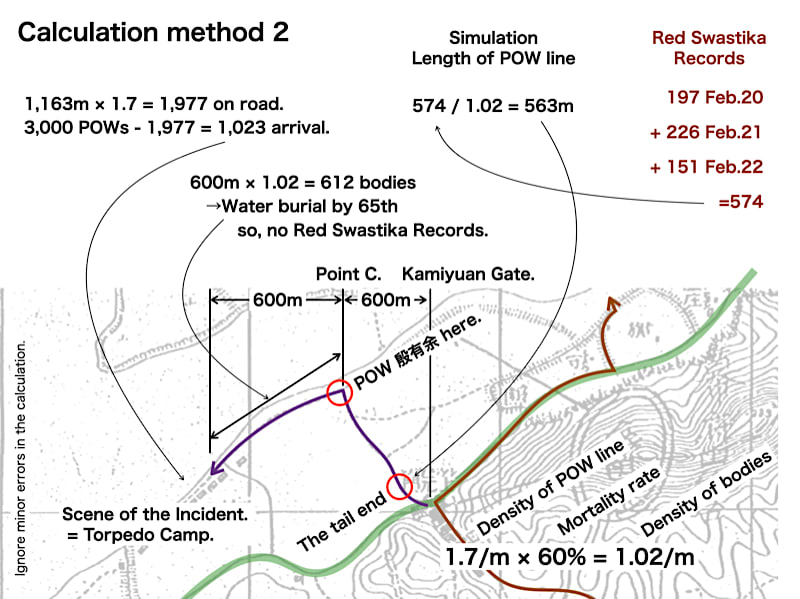
捕虜の人数 Number of POWs
正確には何人の捕虜がいたのか?ある人は15,000人、ある人は20,000人と言う。
なぜこんなに違うのか?
なぜなら、誰も正確に数えたことがないから。
では、どうやって捕虜人数を把握したのか?
捕虜の数は、捕虜になった場所でおおよその数しか報告されない。
Exactly how many POWs were there? Some say 15,000, others say 20,000.
Why the discrepancy?
Because no one has counted them accurately.
So how did they determine the number of POWs?
Only an approximate number of POWs is reported at the place of capture.
For example, it goes like this.
The 1st Company reported “3,000 captured." (actually 2,378)
The 2nd Company reported "2,000 captured." (actually 1,532)
The 3rd Company reported “1,000 captured." (actually 673)
The 4th Company reported “500 captured." (actually 387)
The 5th Company reported “300 captured." (actually 258)
The 6th Company reported “28 captured." (actually 28)
The 7th Company reported “13 captured." (actually 13)
The total number reported to the regiment was 6,841.
The true total was 5,269.
Who knows "5,269”?
No one knows. Only god.
そして司令部が必要なのは概数を早く知ることである。収容場所を探すため、あるいは応援要請をするために概数が必要である。しかし、真数は必要ない。
And the command post needs to know the approximate number as soon as possible. An approximate number is needed to find a place to house them or to call for backup. But a true number is not necessary.
捕虜の数は「軍事的成果」である。従って、多ければ多いほど良い。多い数字が、上級司令部に報告され、マスコミに流される。
日本海軍は、米空母エンタープライズを9回撃沈した。(実際は0回)
日本陸軍は慣例として3倍の数字で「戦果」を報告したという。
The number of POWs is a “military result". Therefore, the more, the better. The higher numbers are reported to the higher command and broadcast to the media.
The Japanese Navy sank the U.S. aircraft carrier Enterprise nine times. (Actually, zero.)
The Japanese Army says they reported “military results” at three times of number, as is customary.
当時の新聞を見れば良い。こういうタイトルの記事になっているはずだ。
「両角部隊大武勲、敵兵一万五千余を捕虜」
Just look at the newspapers of that time. The title of the article should have been something like this.
"The Morozumi troops performed brilliantly, capturing more than 15,000 enemy soldiers."
しかし、歴史を学ぶ者は「戦果」を信じてはいけない。
But, those who study history should not believe “military results".
今日、ロシアとウクライナがばら撒いている「軍事的成果」を信じる専門家はいないはずだ。だから、米英政府や独立機関が独自に試算している。それと同じ。
No expert should believe the “military results" that Russia and Ukraine are scattering today. That is why the US and UK governments or independent organizations are making their own estimates. Same with that.
No expert should believe the “military results" that Russia and Ukraine are scattering today. That is why the US and UK governments or independent organizations are making their own estimates. Same with that.
では、どうやって捕虜の数を知ることができるのか?
収容所から連行された捕虜の数を見れば良い。ここ以外に実数は存在しない。
Then how do we know how many POWs they have?
Just look at the number of POWs taken away from the Camp. There is no real number other than here.
Take a look at the soldier's diary.
兵士の日記 Diary of a Soldier
〔十二月〕十六日
警戒の厳重は益々加はりそれでも〔午〕前十時に第二中隊と衛兵を交代し一安心す、しかし其れも疎の間で午食事中俄に火災起り非常なる騒ぎとなり三分の一程延焼す、午后三時大隊は最後の取るべき手段を決し、捕慮兵約三千を揚子江岸に引率し之を射殺す、戦場ならでは出来ず又見れぬ光景である。
宮本省吾 陣中日記 歩兵第65連隊第四中隊・少尉
十二月十六日
午前中隊は残兵死体整理に出発する、自分は患者として休養す。午后五時に実より塩規錠をもらー、捕慮(虜)三大隊で三千名揚子江岸にて銃殺す、午后十時に分隊員かへる。
本間正勝 戦斗日記 歩兵第65連隊第九中隊・二等兵
December 16th
The vigilance became more and more severe, and even so, at 10:00 a.m., the 2nd Company and the guards were replaced, which was a relief. However, this was short-lived, and during lunch, a fire suddenly broke out, causing a great commotion and spreading about one-third of the fire. At 3:00 p.m., the battalion decided on a last resort and took about 3,000 POWs to the banks of the Yangtze River, where they were shot to death. This was a scene that could not have been done or seen anywhere else but on the battlefield.
Shogo Miyamoto, Diary of a Second Lieutenant in the 65th Infantry Regiment, 4th Company
December 16th
In the morning, the remaining soldiers of the company left to clean up the dead. I rested myself as a patient. At 5:00 p.m. I received my medicine. The 3rd Battalion shot 3,000 POWs on the banks of the Yangtze River. At 10:00 p.m., the detachment members returned.
Homma Masakatsu, War Diary, 65th Infantry Regiment, 9th Company, Private.
警戒の厳重は益々加はりそれでも〔午〕前十時に第二中隊と衛兵を交代し一安心す、しかし其れも疎の間で午食事中俄に火災起り非常なる騒ぎとなり三分の一程延焼す、午后三時大隊は最後の取るべき手段を決し、捕慮兵約三千を揚子江岸に引率し之を射殺す、戦場ならでは出来ず又見れぬ光景である。
宮本省吾 陣中日記 歩兵第65連隊第四中隊・少尉
十二月十六日
午前中隊は残兵死体整理に出発する、自分は患者として休養す。午后五時に実より塩規錠をもらー、捕慮(虜)三大隊で三千名揚子江岸にて銃殺す、午后十時に分隊員かへる。
本間正勝 戦斗日記 歩兵第65連隊第九中隊・二等兵
December 16th
The vigilance became more and more severe, and even so, at 10:00 a.m., the 2nd Company and the guards were replaced, which was a relief. However, this was short-lived, and during lunch, a fire suddenly broke out, causing a great commotion and spreading about one-third of the fire. At 3:00 p.m., the battalion decided on a last resort and took about 3,000 POWs to the banks of the Yangtze River, where they were shot to death. This was a scene that could not have been done or seen anywhere else but on the battlefield.
Shogo Miyamoto, Diary of a Second Lieutenant in the 65th Infantry Regiment, 4th Company
December 16th
In the morning, the remaining soldiers of the company left to clean up the dead. I rested myself as a patient. At 5:00 p.m. I received my medicine. The 3rd Battalion shot 3,000 POWs on the banks of the Yangtze River. At 10:00 p.m., the detachment members returned.
Homma Masakatsu, War Diary, 65th Infantry Regiment, 9th Company, Private.
南京大虐殺を記録した皇軍兵士たち /小野 賢二
Soldiers of the Imperial Army who recorded the Nanjing Massacre / Kenji Ono
https://www.amazon.co.jp/dp/4272520423/
Soldiers of the Imperial Army who recorded the Nanjing Massacre / Kenji Ono
https://www.amazon.co.jp/dp/4272520423/
3,000人の捕虜を連行したと書いてある。12月16日。
They wrote that taken away 3,000 of POWs. On Dec 16.
And...
十二月十六日 晴
定刻起床、午前九時三十分より一時間砲台見学に赴く、午後零時三十分捕虜収容所火災の為出動を命ぜられ同三時帰還す、同所に於て朝日記者横田氏に逢い一般情勢を聴く、捕虜総数一万七千二十五名、夕刻より軍命令により捕虜の三分の一を江岸に引出し1(第1大隊)に於て射殺す。
一日二合宛給養するに百俵を要し兵自身徴発により給養し居る今日到底不可能事にして軍より適当に処分すべしとの命令ありたるものの如し。
遠藤高明 陣中日記
歩兵第65連隊第8中隊・第3次補充 少尉
〔十二月〕十六日
午前中給需伝票等を整理する、一ヶ月振りの整理の為相当手間取る。
午后南京城見学の許しが出たので勇躍して行馬で行く、そして食料品店で洋酒各種を徴発して帰る、丁度見本の様だ、お陰で随分酩酊した。
夕方二万の捕慮(虜)が火災を起し警戒に行った中隊の兵の交代に行く、遂に二万の内三分の一、七千人を今日揚子江畔にて銃殺と決し護衛に行く、そして全部処分を終る、生き残りを銃剣にて刺殺する。
月は十四日、山の端にかかり皎々として青き影の処、断末魔の苦しみの声は全く惨しさこの上なし、戦場ならざれば見るを得ざるところなり、九時半頃帰る、一生忘るる事の出来ざる光影(景)であった。
近藤栄四郎 出征日誌
山砲兵第19連隊第8中隊・編成 伍長
December 16th, clear
Woke up on time and went to visit the battery for one hour starting at 9:30 am. At 0:30 p.m., I was ordered to report to the POWs camp due to a fire, and returned at 3:00 p.m. I met Mr. Yokota, a reporter from the Asahi Shimbun newspaper, and heard about the general situation.
The total number of POWs was 17,025, and by military order, one-third of the POWs were taken to the riverside in the evening, where the 1st Battalion shot them dead. It took 100 bales of rice to provide two cups of rice a day. Since we themselves were fed by requisition, it was impossible for them to do so, and it seems that the military ordered that they should be disposed of appropriately.
Endo Takaaki, Diary in Camp
65th Infantry Regiment, 8th Company, 3rd Replacement Second Lieutenant
December 16th
In the morning, I sorted out slips and other documents. It was the first time in a month that I had to do this, so it took a lot of time.
In the afternoon, I was given permission to visit Nanjing Castle, so I went there with great enthusiasm. I then went to a grocery store to pick up a variety of Western liquors and returned home. It was just like a sample, and thanks to that, I was very intoxicated.
In the evening, 20,000 POWs started a fire, and I went to replace the soldiers of the company that had gone to guard them. Finally, it was decided that 7,000 men, one-third of the 20,000, would be shot today on the banks of the Yangtze River, and I went to escort them.
After all of them were disposed of, the survivors were stabbed to death with bayonets.
The moon was shining on the edge of the mountains on the fourteenth day of the month, and the blue shadows of the mountains were bright and shining. The sound of their desperate suffering was absolutely horrifying. It was a sight I will never forget.
Eishiro Kondo's journal
Organized by the 8th Company, 19th Mountain Artillery Regiment, Corporal
定刻起床、午前九時三十分より一時間砲台見学に赴く、午後零時三十分捕虜収容所火災の為出動を命ぜられ同三時帰還す、同所に於て朝日記者横田氏に逢い一般情勢を聴く、捕虜総数一万七千二十五名、夕刻より軍命令により捕虜の三分の一を江岸に引出し1(第1大隊)に於て射殺す。
一日二合宛給養するに百俵を要し兵自身徴発により給養し居る今日到底不可能事にして軍より適当に処分すべしとの命令ありたるものの如し。
遠藤高明 陣中日記
歩兵第65連隊第8中隊・第3次補充 少尉
〔十二月〕十六日
午前中給需伝票等を整理する、一ヶ月振りの整理の為相当手間取る。
午后南京城見学の許しが出たので勇躍して行馬で行く、そして食料品店で洋酒各種を徴発して帰る、丁度見本の様だ、お陰で随分酩酊した。
夕方二万の捕慮(虜)が火災を起し警戒に行った中隊の兵の交代に行く、遂に二万の内三分の一、七千人を今日揚子江畔にて銃殺と決し護衛に行く、そして全部処分を終る、生き残りを銃剣にて刺殺する。
月は十四日、山の端にかかり皎々として青き影の処、断末魔の苦しみの声は全く惨しさこの上なし、戦場ならざれば見るを得ざるところなり、九時半頃帰る、一生忘るる事の出来ざる光影(景)であった。
近藤栄四郎 出征日誌
山砲兵第19連隊第8中隊・編成 伍長
December 16th, clear
Woke up on time and went to visit the battery for one hour starting at 9:30 am. At 0:30 p.m., I was ordered to report to the POWs camp due to a fire, and returned at 3:00 p.m. I met Mr. Yokota, a reporter from the Asahi Shimbun newspaper, and heard about the general situation.
The total number of POWs was 17,025, and by military order, one-third of the POWs were taken to the riverside in the evening, where the 1st Battalion shot them dead. It took 100 bales of rice to provide two cups of rice a day. Since we themselves were fed by requisition, it was impossible for them to do so, and it seems that the military ordered that they should be disposed of appropriately.
Endo Takaaki, Diary in Camp
65th Infantry Regiment, 8th Company, 3rd Replacement Second Lieutenant
December 16th
In the morning, I sorted out slips and other documents. It was the first time in a month that I had to do this, so it took a lot of time.
In the afternoon, I was given permission to visit Nanjing Castle, so I went there with great enthusiasm. I then went to a grocery store to pick up a variety of Western liquors and returned home. It was just like a sample, and thanks to that, I was very intoxicated.
In the evening, 20,000 POWs started a fire, and I went to replace the soldiers of the company that had gone to guard them. Finally, it was decided that 7,000 men, one-third of the 20,000, would be shot today on the banks of the Yangtze River, and I went to escort them.
After all of them were disposed of, the survivors were stabbed to death with bayonets.
The moon was shining on the edge of the mountains on the fourteenth day of the month, and the blue shadows of the mountains were bright and shining. The sound of their desperate suffering was absolutely horrifying. It was a sight I will never forget.
Eishiro Kondo's journal
Organized by the 8th Company, 19th Mountain Artillery Regiment, Corporal
南京大虐殺を記録した皇軍兵士たち /小野 賢二
Soldiers of the Imperial Army who recorded the Nanjing Massacre / Kenji Ono
Soldiers of the Imperial Army who recorded the Nanjing Massacre / Kenji Ono
捕虜の3分の1を連行したと書いている。12月16日。
They wrote that taken away number of one-third of POWs. On Dec 16.
捕虜の連行を命じられ、実際に連行する捕虜の数を数えたのはこの時だけだ。
It was only then that the POWs were ordered to be taken away and the actual number of POWs being taken away was counted.
命令が何であったかは分からない。しかし、何人かの兵士は「3,000」または「3分の1」と書いている。
命令を出した人は、より真実に近い数字を知っていたのかもしれない。
しかし、65連隊の将校がより真実に近い数字を証言したとしても、歴史家はそれを信じないでしょう。そうやって歴史家は歴史を作り上げてきたのである。
話を戻そう。
「3,000人」が「3分の1」だとすると、総数は9,000人である。
私の推定では、この数字が最も整合性がとれている。
We don't know what the order was. But several soldiers wrote "3,000" or "one-third".
Whoever gave the order may have known a number closer to the truth.
However, even if an officer of the 65th testified to a figure closer to the truth, historians would not believe it. That is how historians have authored history.
Back to the story.
If "3,000" is "one-third," then the total number is 9,000.
From my estimation, these numbers are the most consistent.
日記を書いた兵士にとって捕虜総数は意味のない数字だ。なぜならば、彼らの任務に関係しない。書かれた数字もバラバラである。つまり、それは噂のようなものだ。
しかし、「3千」と「3分の1」は彼らに与えられた命令であり、彼らは実務上、これらの数字を数える必要があった。
我々はこれらの数字に注目すべきである。
For the soldier who wrote the diary, the total number of POWs is meaningless. Because it does not relate to his mission. The written numbers are also scattered. In other words, it is like a rumor.
But "3,000" and "one-third" are the orders given to them, and for all practical purposes, these numbers must be counted.
We must focus on these numbers.
従軍記者の著書 The book by a military reporter.
入城式
十七日午後一時半、松井石根軍司令官が、朝香宮鳩彦、柳川兵助の両師団長を従えて、馬上豊かに中山門から入城した。中山路の両側では、将兵の指揮刀、銃剣がススキの穂のように立ち並んだ。
下関からは、長谷川清艦隊司令長官が海軍部隊を従えて行進してくる。上空には陸海の航空部隊の編隊が爆音を轟かせる。やがて国民政府官舎の屋上に大日章旗が掲げられ、「君が代」が鳴り渡った。
松井軍司令官以下が国民政府楼上に姿を現すと、「万歳」の声が津波のように城内にひびいた。記者席には、約百名の報道陣が集まり、その中には西条八十、大宅壮一、山本實彦改造社長などの姿もあった。
この夜、私たちは野戦支局でふたたび祝いの宴を張ったが、この席で、深沢幹蔵が驚くべき報告をした。深沢は、夕刻、一人で下関に行ってみたが、すぐ下流に多数の死体の山があることを知らされた。行ってみると、死体の山が延々と連なっている。その中に死にきれず動くものがあると、警備の兵が射殺していたという。
死んだ部隊
私は、翌朝、二、三の僚友と車を走らせた。挹江門の死体はすべて取り除かれ、も早、地獄の門をくぐる恐ろしさはなかった。下関をすぎると、なるほど、深沢のいうとおり、道路の揚子江岸に夥しい中国兵の死体の山が連なっている。ところどころは、石油をかけて火をつけたらしく焼死体になっている。
「機銃でやったらしいな」
と祓川が言った。
「それにしても多いなあ」
千はこえていた。二千に達するかも知れない。一個部隊の死体だった。私たちは唖然とした。挹江門の死体詰めといい、この長江岸の死んだ部隊といい、どうしてこういうものがあるのか、私たちには分からなかった。
城内に戻って、警備司令部の参謀に尋ねてみた。少数の日本部隊が、多数の投降部隊を護送中に逆襲を受けたので撃滅した、というのが説明だった。(P121)
Castle Entry Ceremony
At 1:30 p.m. on the 17th, Commander-in-Chief Matsui Iwane, accompanied by division commanders Asakanomiya Yasuhiko and Yanagawa Heisuke, entered the castle from the Zhōngshānmén Gate in a horseback abundance. On both sides of Zhōngshān-streat, the commanding swords and bayonets of the generals stood like ears of silver grass.
From Xiàguān Fleet Commander Kiyoshi Hasegawa marched in with his naval troops. Above in the sky, the formation of air units from the land and sea roared with the sound of explosions. Soon, a large Japanese flag was hoisted on the roof of the National Government building, and "Kimigayo" rang out.
When the Commander-in-Chief Matsui and his staff appeared on the roof of the National Government Building, the shouts of "Banzai" echoed through the castle like a tidal wave. About a hundred reporters gathered at the press box, among them were Saijo Yaso, Souichi Ooya, and "Kaizou" President Sanehiko Yamamoto.
That evening, we again held a celebration party at the Field Office, where Mikizo Fukasawa made a startling report. In the evening, Fukazawa went to Xiàguānalone and was informed that there were many dead bodies piled up just downstream. When he went there, he found that the piles of corpses were endless. If any of them were not dead and moved, the guards would shoot them dead.
Dead troops
The next morning, I drove away with two or three of my colleagues. All the dead bodies at the Yijiang Gate(挹江門) had been removed, and there was no longer any fear of passing through the gates of hell. After passing Xiàguān, we found, as Fukasawa had said, a great number of dead Chinese soldiers piled up along the banks of the Yangtze River. In some places, the bodies were burnt to death, as if they had been set on fire by pouring oil over them.
"I heard they were killed by machine gun fire"
Haraikawa said.
"But still, that's a lot of bodies."
There were more than 1,000 bodies, maybe close to 2,000. It was the body of one unit. We were stunned. We had no idea why there were so many corpses at the Yijiang Gate(挹江門) or dead troops along the banks of the Yangtze River.
We returned to the castle and asked the chief of staff of the security command post. He explained that a small number of Japanese troops had been struck back while escorting a large number of surrendered troops and had been destroyed.(P121)
十七日午後一時半、松井石根軍司令官が、朝香宮鳩彦、柳川兵助の両師団長を従えて、馬上豊かに中山門から入城した。中山路の両側では、将兵の指揮刀、銃剣がススキの穂のように立ち並んだ。
下関からは、長谷川清艦隊司令長官が海軍部隊を従えて行進してくる。上空には陸海の航空部隊の編隊が爆音を轟かせる。やがて国民政府官舎の屋上に大日章旗が掲げられ、「君が代」が鳴り渡った。
松井軍司令官以下が国民政府楼上に姿を現すと、「万歳」の声が津波のように城内にひびいた。記者席には、約百名の報道陣が集まり、その中には西条八十、大宅壮一、山本實彦改造社長などの姿もあった。
この夜、私たちは野戦支局でふたたび祝いの宴を張ったが、この席で、深沢幹蔵が驚くべき報告をした。深沢は、夕刻、一人で下関に行ってみたが、すぐ下流に多数の死体の山があることを知らされた。行ってみると、死体の山が延々と連なっている。その中に死にきれず動くものがあると、警備の兵が射殺していたという。
死んだ部隊
私は、翌朝、二、三の僚友と車を走らせた。挹江門の死体はすべて取り除かれ、も早、地獄の門をくぐる恐ろしさはなかった。下関をすぎると、なるほど、深沢のいうとおり、道路の揚子江岸に夥しい中国兵の死体の山が連なっている。ところどころは、石油をかけて火をつけたらしく焼死体になっている。
「機銃でやったらしいな」
と祓川が言った。
「それにしても多いなあ」
千はこえていた。二千に達するかも知れない。一個部隊の死体だった。私たちは唖然とした。挹江門の死体詰めといい、この長江岸の死んだ部隊といい、どうしてこういうものがあるのか、私たちには分からなかった。
城内に戻って、警備司令部の参謀に尋ねてみた。少数の日本部隊が、多数の投降部隊を護送中に逆襲を受けたので撃滅した、というのが説明だった。(P121)
Castle Entry Ceremony
At 1:30 p.m. on the 17th, Commander-in-Chief Matsui Iwane, accompanied by division commanders Asakanomiya Yasuhiko and Yanagawa Heisuke, entered the castle from the Zhōngshānmén Gate in a horseback abundance. On both sides of Zhōngshān-streat, the commanding swords and bayonets of the generals stood like ears of silver grass.
From Xiàguān Fleet Commander Kiyoshi Hasegawa marched in with his naval troops. Above in the sky, the formation of air units from the land and sea roared with the sound of explosions. Soon, a large Japanese flag was hoisted on the roof of the National Government building, and "Kimigayo" rang out.
When the Commander-in-Chief Matsui and his staff appeared on the roof of the National Government Building, the shouts of "Banzai" echoed through the castle like a tidal wave. About a hundred reporters gathered at the press box, among them were Saijo Yaso, Souichi Ooya, and "Kaizou" President Sanehiko Yamamoto.
That evening, we again held a celebration party at the Field Office, where Mikizo Fukasawa made a startling report. In the evening, Fukazawa went to Xiàguānalone and was informed that there were many dead bodies piled up just downstream. When he went there, he found that the piles of corpses were endless. If any of them were not dead and moved, the guards would shoot them dead.
Dead troops
The next morning, I drove away with two or three of my colleagues. All the dead bodies at the Yijiang Gate(挹江門) had been removed, and there was no longer any fear of passing through the gates of hell. After passing Xiàguān, we found, as Fukasawa had said, a great number of dead Chinese soldiers piled up along the banks of the Yangtze River. In some places, the bodies were burnt to death, as if they had been set on fire by pouring oil over them.
"I heard they were killed by machine gun fire"
Haraikawa said.
"But still, that's a lot of bodies."
There were more than 1,000 bodies, maybe close to 2,000. It was the body of one unit. We were stunned. We had no idea why there were so many corpses at the Yijiang Gate(挹江門) or dead troops along the banks of the Yangtze River.
We returned to the castle and asked the chief of staff of the security command post. He explained that a small number of Japanese troops had been struck back while escorting a large number of surrendered troops and had been destroyed.(P121)
南京大虐殺はなかったー『戦争の流れの中に』からの抜粋 /前田 雄二
There was no Nanking Massacre: Excerpts from "In the Stream of War" / Yuji Maeda
https://www.amazon.co.jp/dp/4793903932/
There was no Nanking Massacre: Excerpts from "In the Stream of War" / Yuji Maeda
https://www.amazon.co.jp/dp/4793903932/
Question 1: How did Mr. Maeda, the military reporter, get there?
Answer 1: He went by car.
Question 2: Where were the many dead bodies?
Answer 2: Around the road.
Question 3: How many bodies?
Answer 3: More than 1,000, maybe 2,000.
Question 4: When did Mr. Maeda see them?
Answer 4: On the morning of Dec 18.
Question 5: Why did reporter Maeda write this story in his book?
Answer 5: Because even a military reporter who was used to seeing the battlefield was stunned by the sight.
再び、兵士の日記 Diary of a Soldier, again.
十二月十八日 曇、寒
午前零時敗残兵の死体かたづけに出動の命令が出る、小行李全部が出発する、途中死屍累々として其の数を知れぬ敵兵の中を行く、吹いて来る一順の風もなまぐさく何んとなく殺気たつて居る、揚子江岸で捕慮○○○名銃殺する、昨日まで月光コウコウとして居つたのが今夜は曇り、薄明い位、霧の様な雨がチラチラ降って来た、寒い北風が切る様だ、捕慮銃殺に行つた十二中隊の戦友が流弾に腹部を貫通され死に近い断末魔のうめき声が身を切る様に聞い悲哀の情がみなぎる、午前三時帰営、就寝、朝はゆつくり起床(後略)
斎藤次郎陣中日記
December 18, cloudy, cold
At midnight, orders are given to dispatch troops to clean up the corpses of the defeated soldiers.
All members of the convoy depart.
On the way, they pass through an unknown number of enemy soldiers, many of whom are dead.
The winds of Isshun were blowing softly and with a certain deadly force.
The enemy soldiers were shot dead on the banks of the Yangtze River.
Yesterday the moonlight was bright, but tonight it is cloudy and dim.
A misty rain is falling.
A cold northerly wind was blowing.
A comrade-in-arms of the 12th Company, who had gone for taken away and shoot POWs, was pierced through the abdomen by a stray bullet, and his near-death moan was so heartbreaking that I could hear him cry out in despair.
He returned to camp at 3:00 a.m., went to bed, and woke up in the morning. (Omitted)
Diary of Jiro Saito
午前零時敗残兵の死体かたづけに出動の命令が出る、小行李全部が出発する、途中死屍累々として其の数を知れぬ敵兵の中を行く、吹いて来る一順の風もなまぐさく何んとなく殺気たつて居る、揚子江岸で捕慮○○○名銃殺する、昨日まで月光コウコウとして居つたのが今夜は曇り、薄明い位、霧の様な雨がチラチラ降って来た、寒い北風が切る様だ、捕慮銃殺に行つた十二中隊の戦友が流弾に腹部を貫通され死に近い断末魔のうめき声が身を切る様に聞い悲哀の情がみなぎる、午前三時帰営、就寝、朝はゆつくり起床(後略)
斎藤次郎陣中日記
December 18, cloudy, cold
At midnight, orders are given to dispatch troops to clean up the corpses of the defeated soldiers.
All members of the convoy depart.
On the way, they pass through an unknown number of enemy soldiers, many of whom are dead.
The winds of Isshun were blowing softly and with a certain deadly force.
The enemy soldiers were shot dead on the banks of the Yangtze River.
Yesterday the moonlight was bright, but tonight it is cloudy and dim.
A misty rain is falling.
A cold northerly wind was blowing.
A comrade-in-arms of the 12th Company, who had gone for taken away and shoot POWs, was pierced through the abdomen by a stray bullet, and his near-death moan was so heartbreaking that I could hear him cry out in despair.
He returned to camp at 3:00 a.m., went to bed, and woke up in the morning. (Omitted)
Diary of Jiro Saito
南京大虐殺を記録した皇軍兵士たち /小野 賢二
Soldiers of the Imperial Army who recorded the Nanjing Massacre / Kenji Ono
Soldiers of the Imperial Army who recorded the Nanjing Massacre / Kenji Ono
Question 1: Where were the many corpses along the way?
Answer 1: Near the roadside.
Question 2: Why were his comrades-in-arms shot?
Answer 2: An unexpected incident occurred suddenly.
Question 3: Where did the incident occur?
Answer 3: On the banks of the river and on the road to it.
これは前田記者の目撃と似てる。
This is similar to what the Maeda reporter witnessed.
その時、捕虜はどこにいた? Where were the POWs at that time?
捕虜の殷有余氏は事件現場まで600mの地点にいた。12月16日。
The POW, Yin Youyou(殷有余), were 600 meters from the scene of the incident. On Dec 16.
魚雷営の大虐殺
一九三七年十二月十五日、南京城陥落の次の日、一般人と武器を捨てた軍人九千余人は、日寇(*5)の俘虜とされたのち、海軍魚雷営まで押送され、機関銃による集中掃射を受け、殷有余ら九人が脱出したほかは全員殺害された。被害者殷有余が法廷でおこなった証言資料はつぎのように指摘している。
「(農暦) 民国二十六年〔一九三七年〕十一月十一日(*6)、被害者わたくしは上元門において敵に縄で縛り上げられました。わたくしと一緒に俘虜となった官兵および民衆は約三百余人で、胡姓の瓦葺きの家に押し込められました。十三日夜になって、またもや上元門外の道路沿いに追い立てられながら魚雷営の長江の端まで来た時、敵はすでに機関銃四挺を設置済みで、拉致されてきた計約九千人以上の一群の人々が行進している最中、敵はたちまち機関銃を発射し、掃射を加えたのです」
この時の集団大虐殺は夜間におこなわれたため、殷有余ら九人は銃声を聞いて倒れ込み、血だまりの中に横たわっていて、幸いにも銃弾に当らず、死を免れることができた。(P22)
Torpedo Brigade Massacre
On December 15, 1937, the day after the fall of Nanjing City, more than 9,000 civilians and military personnel who had laid down their arms were taken prisoner by the Japanese pirates (*5) and sent to the naval torpedo brig, where they were subjected to intensive machine gun fire, killing all but nine, including Yin Youyou(殷有余), who escaped. The victim, Yin Youyou(殷有余), gave the following testimony in court.
"On November 11, 1937 (*6), I, the victim, was tied up by the enemy at Kamiyuan Gate(上元門). I was taken prisoner together with about 300 or so other government soldiers and people, who were forced into the tiled house of a Hu surname. On the night of the 13th, when we were again driven along the road outside Kamiyuan Gate(上元門) to the edge of the Yangtze River at Torpedo Camp, the enemy had already set up four machine guns, and as a group of about 9,000 or more people who had been abducted were marching along, the enemy immediately fired their machine guns and began to sweep us up. "
Since the massacre took place at night, Yin Youyou(殷有余) and nine others fell to the ground upon hearing the gunshots and lay in a pool of blood, fortunately avoiding being hit by bullets and escaping death. (P22)
*5:日寇とは日本侵略者の意。あえて訳さず日寇のままにした。
*6:農暦十一月は新暦十二月。Lunar calendar.
一九三七年十二月十五日、南京城陥落の次の日、一般人と武器を捨てた軍人九千余人は、日寇(*5)の俘虜とされたのち、海軍魚雷営まで押送され、機関銃による集中掃射を受け、殷有余ら九人が脱出したほかは全員殺害された。被害者殷有余が法廷でおこなった証言資料はつぎのように指摘している。
「(農暦) 民国二十六年〔一九三七年〕十一月十一日(*6)、被害者わたくしは上元門において敵に縄で縛り上げられました。わたくしと一緒に俘虜となった官兵および民衆は約三百余人で、胡姓の瓦葺きの家に押し込められました。十三日夜になって、またもや上元門外の道路沿いに追い立てられながら魚雷営の長江の端まで来た時、敵はすでに機関銃四挺を設置済みで、拉致されてきた計約九千人以上の一群の人々が行進している最中、敵はたちまち機関銃を発射し、掃射を加えたのです」
この時の集団大虐殺は夜間におこなわれたため、殷有余ら九人は銃声を聞いて倒れ込み、血だまりの中に横たわっていて、幸いにも銃弾に当らず、死を免れることができた。(P22)
Torpedo Brigade Massacre
On December 15, 1937, the day after the fall of Nanjing City, more than 9,000 civilians and military personnel who had laid down their arms were taken prisoner by the Japanese pirates (*5) and sent to the naval torpedo brig, where they were subjected to intensive machine gun fire, killing all but nine, including Yin Youyou(殷有余), who escaped. The victim, Yin Youyou(殷有余), gave the following testimony in court.
"On November 11, 1937 (*6), I, the victim, was tied up by the enemy at Kamiyuan Gate(上元門). I was taken prisoner together with about 300 or so other government soldiers and people, who were forced into the tiled house of a Hu surname. On the night of the 13th, when we were again driven along the road outside Kamiyuan Gate(上元門) to the edge of the Yangtze River at Torpedo Camp, the enemy had already set up four machine guns, and as a group of about 9,000 or more people who had been abducted were marching along, the enemy immediately fired their machine guns and began to sweep us up. "
Since the massacre took place at night, Yin Youyou(殷有余) and nine others fell to the ground upon hearing the gunshots and lay in a pool of blood, fortunately avoiding being hit by bullets and escaping death. (P22)
*5:日寇とは日本侵略者の意。あえて訳さず日寇のままにした。
*6:農暦十一月は新暦十二月。Lunar calendar.
証言・南京大虐殺―戦争とはなにか / 南京市文史資料研究会
Testimony: The Nanjing Massacre - What is War? / Nanjing City Cultural and Historical Materials Research Association
https://www.amazon.co.jp/dp/4250840247/
Testimony: The Nanjing Massacre - What is War? / Nanjing City Cultural and Historical Materials Research Association
https://www.amazon.co.jp/dp/4250840247/
この書籍は中国が1980年代に国内向けに刊行したのを日本語訳にしたものである。
This book is a Japanese translation of a book originally published by China for its domestic market in the 1980s.
This book is a Japanese translation of a book originally published by China for its domestic market in the 1980s.
Question 1: What condition were the POWs in when Yin Youyou(殷有余)was fired upon?
Answer 1: The POWs were in the process of marching.
Question 2: Where was Yin Youyou(殷有余)at that time?
Answer 2: He had just arrived at the edge of the Yangtze River at the torpedo camp via the road outside Kamiyuan Gate(上元門).
Question 3: How did Yin Youyou(殷有余) survive?
Answer 3: He pretended to be dead.
Question 4: How many people survived?
Answer 4: Nine, including Yin Youyou(殷有余).
Question 5: Why weren't they stabbed by Japanese bayonets?
Answer 5: Because they were far away from the scene of the machine gun fire.
捕虜の行進を上から見る A view of the POWs march from above.
銃殺があった 17日、この山頂で警備に当たっていたという兵士がいた。歩兵第六十五聯隊第八中隊の上等兵だ。
(中略)
「幕府山の頂上ですね。砲台のところで警備をしていた。揚子江に面した場所で見晴らしが良いところで川を通る船が良く見えた。捕虜は支那の兵舎かな? 藁葺き屋根の兵舎に入れてあったから川まで何キロあるのかな……」
山頂からは、捕虜を収容していた建物から揚子江までがぐるりと見渡せたという。
「あれは午後だったと思う。歩いていた捕虜の姿がそこから見えた。ぞろぞろと。相当に大きな道路だったが、その道一杯に歩いていた。速度は早くない。先頭が揚子江の岸に着いていても後尾はまだ(収容所を) 出ていないぐらい長かった。相当な人数だったね」
夜になって眼下に望んだのは、暗闇の中にチカチカと輝くいくつもの光だった。
「銃撃している機関銃の光を見た。暗くなってだから良くわからないが、あちこちで光っていた。そん時は、ただやっているなという感じ。当時は関心を持たないんだね。命令だからね……」
On the 17th, the day of the shooting, there was a soldier who was on guard at the top of this mountain. He was a private in the 65th Infantry Regiment, 8th Company.
(omitted)
"It's the top of Bakufu Mountain. We were guarding at the gun emplacement. We were facing the Yangtze River and had a good vantage point from which we could see the boats passing on the river. Is the prisoner of war a branch barracks? They were kept in thatched-roof barracks, so I wonder how many kilometers it is to the river. ......"
From the top of the mountain, he said, he could see all the way from the building where the POWs were being held to the Yangtze River.
"I think that was in the afternoon. I could see the POWs on foot from there. They were all over the place. It was a fairly large road, but they were walking along the entire length of it. They were not fast. It was so long that the first group had reached the bank of the Yangtze and the last had not yet left the camp. There were quite a few of us."
At night, he looked down and saw many lights flickering in the darkness.
"I saw the light of a machine gun firing. It was dark, so I couldn't make them out, but they were glowing all over the place. At that time, I just thought they were doing it. You didn't have any interest in it at the time. It's an order. ......"
(中略)
「幕府山の頂上ですね。砲台のところで警備をしていた。揚子江に面した場所で見晴らしが良いところで川を通る船が良く見えた。捕虜は支那の兵舎かな? 藁葺き屋根の兵舎に入れてあったから川まで何キロあるのかな……」
山頂からは、捕虜を収容していた建物から揚子江までがぐるりと見渡せたという。
「あれは午後だったと思う。歩いていた捕虜の姿がそこから見えた。ぞろぞろと。相当に大きな道路だったが、その道一杯に歩いていた。速度は早くない。先頭が揚子江の岸に着いていても後尾はまだ(収容所を) 出ていないぐらい長かった。相当な人数だったね」
夜になって眼下に望んだのは、暗闇の中にチカチカと輝くいくつもの光だった。
「銃撃している機関銃の光を見た。暗くなってだから良くわからないが、あちこちで光っていた。そん時は、ただやっているなという感じ。当時は関心を持たないんだね。命令だからね……」
On the 17th, the day of the shooting, there was a soldier who was on guard at the top of this mountain. He was a private in the 65th Infantry Regiment, 8th Company.
(omitted)
"It's the top of Bakufu Mountain. We were guarding at the gun emplacement. We were facing the Yangtze River and had a good vantage point from which we could see the boats passing on the river. Is the prisoner of war a branch barracks? They were kept in thatched-roof barracks, so I wonder how many kilometers it is to the river. ......"
From the top of the mountain, he said, he could see all the way from the building where the POWs were being held to the Yangtze River.
"I think that was in the afternoon. I could see the POWs on foot from there. They were all over the place. It was a fairly large road, but they were walking along the entire length of it. They were not fast. It was so long that the first group had reached the bank of the Yangtze and the last had not yet left the camp. There were quite a few of us."
At night, he looked down and saw many lights flickering in the darkness.
"I saw the light of a machine gun firing. It was dark, so I couldn't make them out, but they were glowing all over the place. At that time, I just thought they were doing it. You didn't have any interest in it at the time. It's an order. ......"
「南京事件」を調査せよ /清水潔
Investigate the "Nanking Incident" / Kiyoshi Shimizu
https://www.amazon.co.jp/dp/B077TP2SL8/
Investigate the "Nanking Incident" / Kiyoshi Shimizu
https://www.amazon.co.jp/dp/B077TP2SL8/
Question 1: How long is the length of the POWs line?
Answer 1: The same distance from the camp to the Yangtze River.
Question 2: Do you know the distance from the camp to the Yangtze River?
Answer 2: Yes. 3.6 km.
Question 3: Can you calculate the density of the POWs line?
Answer 3: Yes. If there are 6,000 POWs, then it is 1.7 POW/m.
Where was Lt. Kakuta? 角田中尉はどこにいた?
角田中尉は捕虜隊列の最後尾にいた。12月17日。
Lt. Kakuta was at the tail end of the POWs line. Dec 17.
(角田中尉の証言)
「さて、河岸への連行にあたっては、私は役目を免除されました。が、収容所はからっぽになったし、ひまでしたので、連行の列の最後尾についていったのです。ところが、前方で乱射乱撃が始まり、どんどん銃弾が飛んでくる。私は道のわきにあるクリークのようなものに飛び込み、危難を避けました。味方の銃弾で死んではいられないし、恐ろしい思いをしました。また『突発だな』と私には感じられました。突発でなかったら、味方の方向に銃弾が飛んでくるなんて考えられませんよ。とにかく無茶な射撃でした。計画的に殺す気なら、あんなふうに銃弾は飛ぶわけないですからね」(P111)
(Testimony of Lt. Kakuta)
"I was relieved of my role in taking the POWs to the riverbank.However, the camp was empty and I was free, so I followed at the end of the line.
However, a wild shooting started in front of us, and bullets came flying faster and faster. I jumped into a kind of creek on the side of the road to avoid harm.
I didn't want to be killed by bullets from my allies, and it was a horrible feeling. It felt "sudden again" to me. If it wasn't a sudden burst, I can't imagine bullets flying in the direction of my allies. Anyway, it was a reckless shooting. If they had planned to kill him, the bullets would not have flown like that." (P111)
「さて、河岸への連行にあたっては、私は役目を免除されました。が、収容所はからっぽになったし、ひまでしたので、連行の列の最後尾についていったのです。ところが、前方で乱射乱撃が始まり、どんどん銃弾が飛んでくる。私は道のわきにあるクリークのようなものに飛び込み、危難を避けました。味方の銃弾で死んではいられないし、恐ろしい思いをしました。また『突発だな』と私には感じられました。突発でなかったら、味方の方向に銃弾が飛んでくるなんて考えられませんよ。とにかく無茶な射撃でした。計画的に殺す気なら、あんなふうに銃弾は飛ぶわけないですからね」(P111)
(Testimony of Lt. Kakuta)
"I was relieved of my role in taking the POWs to the riverbank.However, the camp was empty and I was free, so I followed at the end of the line.
However, a wild shooting started in front of us, and bullets came flying faster and faster. I jumped into a kind of creek on the side of the road to avoid harm.
I didn't want to be killed by bullets from my allies, and it was a horrible feeling. It felt "sudden again" to me. If it wasn't a sudden burst, I can't imagine bullets flying in the direction of my allies. Anyway, it was a reckless shooting. If they had planned to kill him, the bullets would not have flown like that." (P111)
南京の氷雨―虐殺の構造を追って /阿部 輝郎
The Ice Rain of Nanking: Tracing the Structure of the Massacre / Teruo Abe
https://iss.ndl.go.jp/books/R100000002-I000002048426-00
The Ice Rain of Nanking: Tracing the Structure of the Massacre / Teruo Abe
https://iss.ndl.go.jp/books/R100000002-I000002048426-00
Question 1: Where was Lt. Kakuta when the incident occurred?
Answer 1: He was at the tail end of the POWs line.
Question 2: What did Lt. Kakuta do when the incident occurred?
Answer 2: He jumped into what looked like a creek to avoid friendly fire.
彼がいた場所を私は航空写真で発見した。
I found where he was on an aerial photograph.
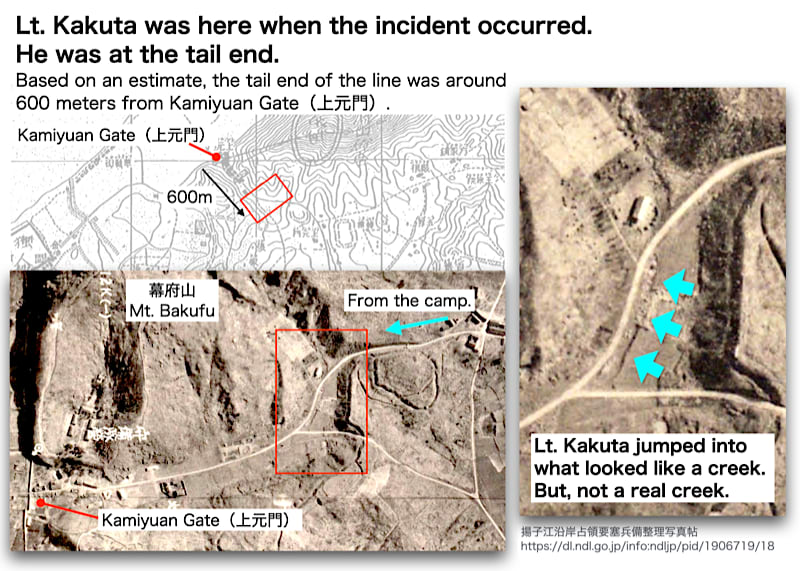
https://dl.ndl.go.jp/info:ndljp/pid/1906719/18
議論のための資料 Materials for Discussion
捕虜の総数について
On the total number of POWs.
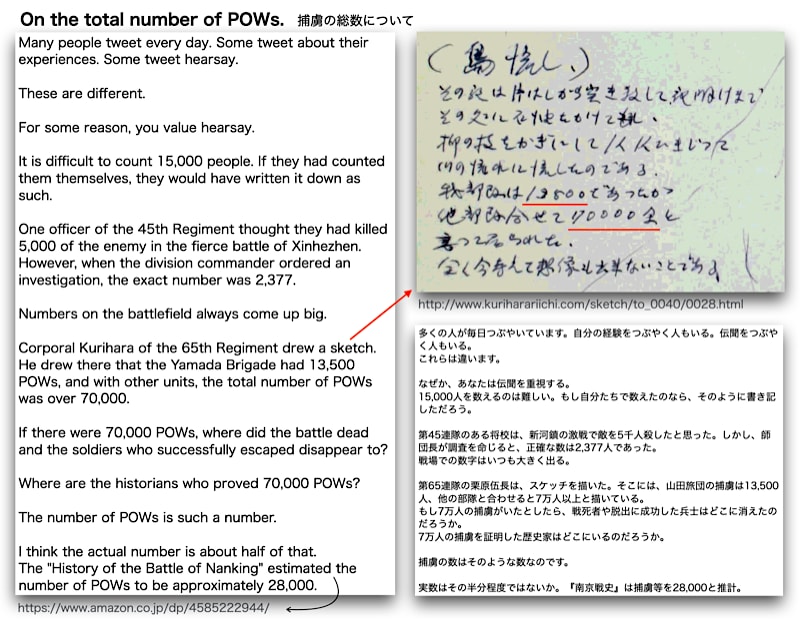
http://www.kuriharariichi.com/sketch/to_0040/0028.html
https://www.amazon.co.jp/dp/4585222944/
捕まった部隊
The captured troops.
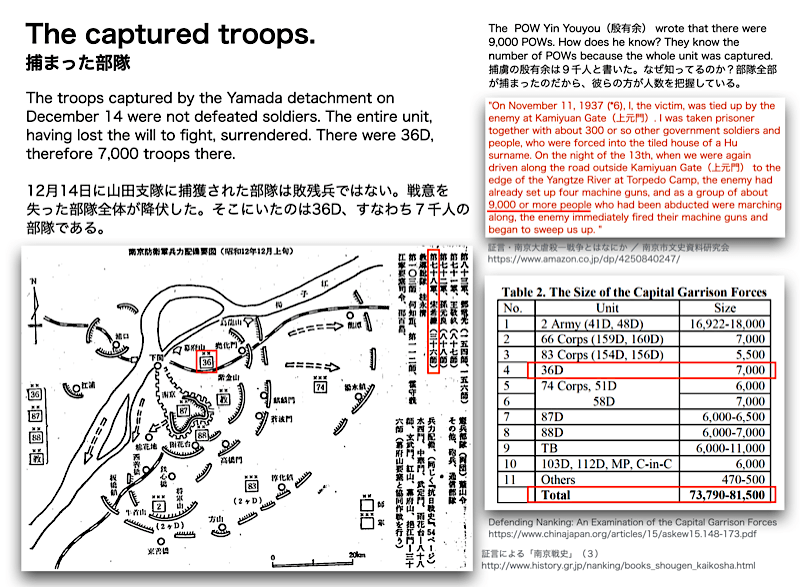
https://www.amazon.co.jp/dp/4250840247/
https://www.chinajapan.org/articles/15/askew15.148-173.pdf
http://www.history.gr.jp/nanking/books_shougen_kaikosha.html
現場の遺体はそう多くない
Not so many bodies at the scene.
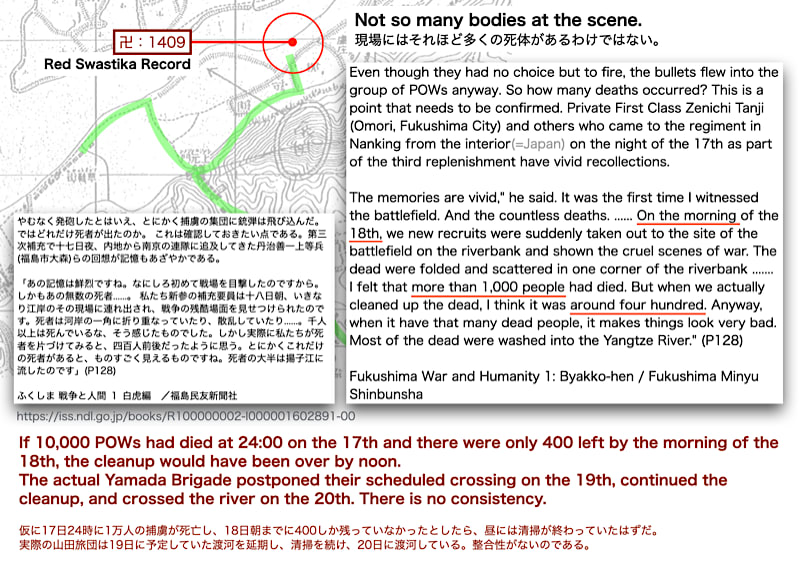
https://iss.ndl.go.jp/books/R100000002-I000001602891-00
埋葬記録の場所
Location of burial records.

https://dl.ndl.go.jp/info:ndljp/pid/10273906
前田記者の目撃談
Maeda Reporter's Eyewitness Story
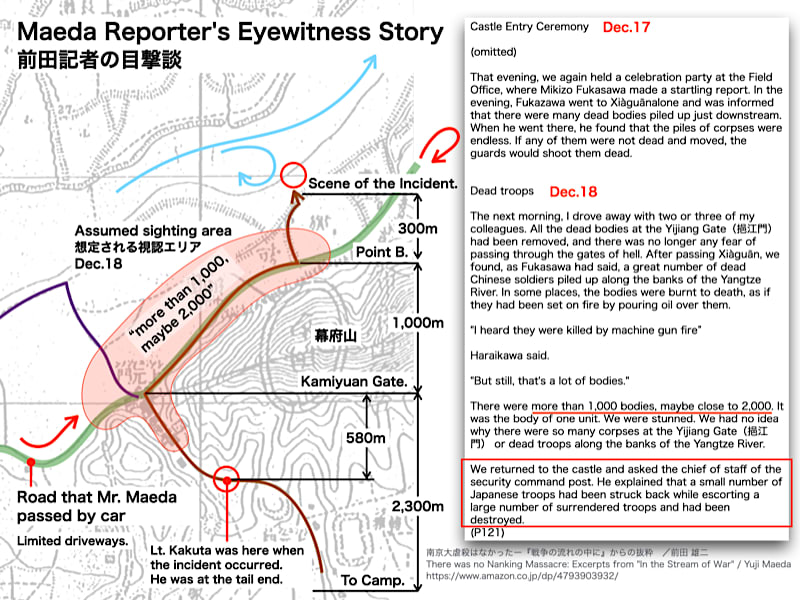
https://www.amazon.co.jp/dp/4793903932/
《改版履歴》
2022.09.20 初版
2022.09.22 議論のための資料 Materials for Discussion 追加
2022.11.25 議論のための資料 Materials for Discussion に追記
《関連記事》
《幕府山事件》概要編
https://blog.goo.ne.jp/zf-phantom/e/4997887cce0ec9d9cc7e17f92562d37c
《幕府山事件》地理編
http://blog.goo.ne.jp/zf-phantom/e/9b9a860e2c39a923405efe2946d766ed
《幕府山事件》時系列編
https://blog.goo.ne.jp/zf-phantom/e/b371d9b304f84e519677960e6b644f17
《幕府山事件》自衛発砲説
https://blog.goo.ne.jp/zf-phantom/e/13fd6d3e71081054bca30edc4a796259
《幕府山事件》魚雷営現場の外形的検証
https://blog.goo.ne.jp/zf-phantom/e/5fe165164b8b9537c71c97f707ef986b
《幕府山事件》草鞋峡現場の外形的検証(前編)
https://blog.goo.ne.jp/zf-phantom/e/e5c0c9b19ec42a60c0d038314aa4e32a
《幕府山事件》草鞋峡現場の外形的検証(後編)
https://blog.goo.ne.jp/zf-phantom/e/67c2655b8679239d13220dde13c349a7
《幕府山事件》埋葬記録の絞り込み
https://blog.goo.ne.jp/zf-phantom/e/fb155aa7d56ce5e3e43f490f8fe5eb68
《幕府山事件》試算モデル
https://blog.goo.ne.jp/zf-phantom/e/548a45b8a1f4e8c8c0fee0fab3b670e0
《幕府山事件》本当の意図
https://blog.goo.ne.jp/zf-phantom/e/a8da8d8a68b1117afd6ea3cf649d104f
★南京大虐殺の真相(目次)
https://blog.goo.ne.jp/zf-phantom/e/9e454ced16e4e4aa30c4856d91fd2531










